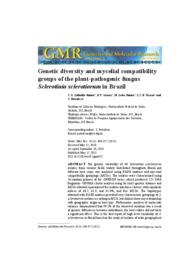Genetic diversity and mycelial compatibility groups of the plant-pathogenic fungus Sclerotinia sclerotiorum in Brazil.
Genetic diversity and mycelial compatibility groups of the plant-pathogenic fungus Sclerotinia sclerotiorum in Brazil.
Author(s): LITHOLDO JÚNIOR, C. G.; GOMES, E. V.; LOBO JUNIOR, M.; NASSER, L. C. B.; PETROFEZA, S.
Summary: The genetic variability of 40 Sclerotinia sclerotiorum isolates from various fields widely distributed throughout Brazil and different host crops was analyzed using RAPD markers and mycelial compatibility groupings (MCGs). The isolates were characterized using 16 random primers of the OPERON series, which produced 121 DNA fragments. UPGMA cluster analysis using Jaccard?s genetic distance and MCGs allowed separation of the isolates into three clusters, with similarity indices of 68.2, 61.8, and 61.8%, and five MCGs. The haplotypes obtained with RAPD markers provided very characteristic groupings of S. sclerotiorum isolates according to MCG, but did not show any relationship with geographic origin or host type. Furthermore, analysis of molecular variance demonstrated that 99.1% of the observed variation was a result of genetic differences between individuals; the host culture did not have a significant effect. This is the first report of high level variability of S. sclerotiorum in Brazil based on the study of isolates of wide geographical origin, supported by RAPD markers and MCGs. These results endorse the prevalence of sexual reproduction in tropical and subtropical regions in contrast to clonal reproduction in temperate regions.
Publication year: 2011
Types of publication: Journal article
Unit: Embrapa Rice & Beans
Keywords: Diversidade genética, Mofo branco, Sclerotinia sclerotiorum
Observation
Some of Embrapa's publications are published as ePub files. To read them, use or download one of the following free software options to your computer or mobile device. Android: Google Play Books; IOS: iBooks; Windows and Linux: Calibre.
Access other publications
Access the Agricultural Research Database (BDPA) to consult Embrapa's full library collection and records.
Visit Embrapa Bookstore to purchase books and other publications sold by Embrapa.

